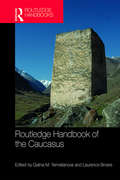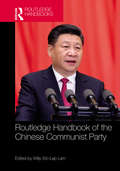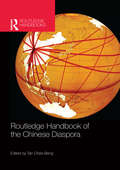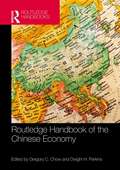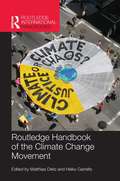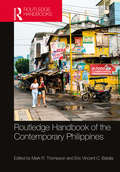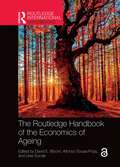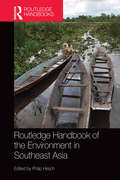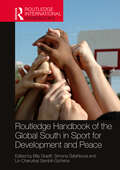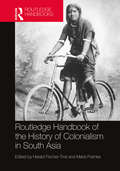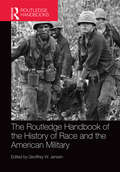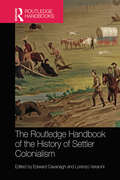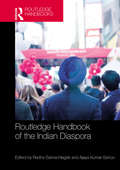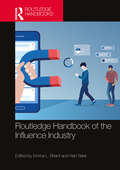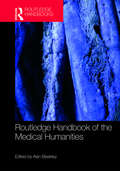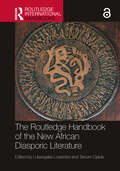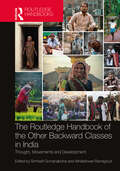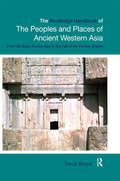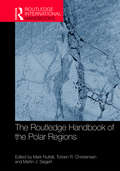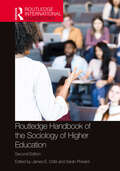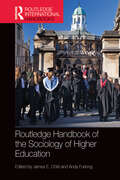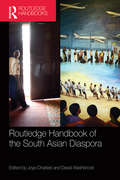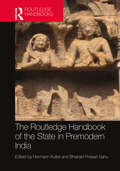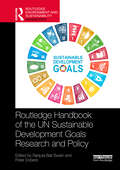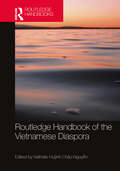- Table View
- List View
Routledge Handbook of the Caucasus
by Galina M. Yemelianova Laurence BroersThe Routledge Handbook of the Caucasus offers an integrated, multidisciplinary overview of the historical, ethno-linguistic, cultural, socio-economic and political complexities of the Caucasus. Covering both the North and South Caucasus, the book gathers together leading Western, Caucasian and Russian scholars of the region from different disciplines in the humanities and social sciences. Following a thorough introduction by the editors, the handbook is divided into six parts which combine thematic and chronological principles: Place, peoples and culture Political history The contemporary Caucasus: politics, economics and societies Conflict and political violence The Caucasus in the wider world Societal and cultural dynamics. This handbook will be an essential reference work for scholars interested in Russian and Eastern-European studies, Eurasian history and politics, and religious and Islamic studies.
Routledge Handbook of the Chinese Communist Party
by Willy Wo-Lap LamWhilst the Chinese Communist Party is one of the most powerful political institutions in the world, it is also one of the least understood, due to the party’s secrecy and tight control over the archives, the press and the Internet. Having governed the People’s Republic of China for nearly 70 years though, much interest remains into how this quintessentially Leninist party governs one-fifth of the world and runs the world’s second-largest economy. The Routledge Handbook of the Chinese Communist Party gives a comprehensive and multi-faceted picture of the party’s traditions and values – as well as its efforts to stay relevant in the twenty-first century. It uses a wealth of contemporary data and qualitative analysis to explore the intriguing relationship between the party on the one hand, and the government, the legal and judicial establishment and the armed forces, on the other. Tracing the influence of Marx, Engels, Lenin and Stalin, as well as Mao Zedong, on contemporary leaders ranging from Deng Xiaoping and Jiang Zemin to Hu Jintao and Xi Jinping, the sections cover: the party’s history and traditions; how the party works and seeks to remain relevant; major policy arenas; the CCP in the twenty-first century. The Routledge Handbook of the Chinese Communist Party will be of interest to students and scholars of Chinese Politics, Asian Politics, Political Parties and International Relations. Go to https://www.bookshop4u.com/lw1 to see Willy Lam introduce the book.
Routledge Handbook of the Chinese Diaspora
by Tan Chee-BengWith around 40 million people worldwide, the ethnic Chinese and the Chinese in diaspora form the largest diaspora in the world. The economic reform of China which began in the late 1970s marked a huge phase of migration from China, and the new migrants, many of whom were well educated, have had a major impact on the local societies and on China. This is the first interdisciplinary Handbook to examine the Chinese diaspora, and provides a comprehensive analysis of the processes and effects of Chinese migration under the headings of: Population and distribution Mainland China and Taiwan’s policies on the Chinese overseas Migration: past and present Economic and political involvement Localization, transnational networks and identity Education, literature and media The Routledge Handbook of the Chinese Diaspora brings together a significant number of specialists from a number of diverse disciplines and covers the major areas of the study of Chinese overseas. This Handbook is therefore an important and valuable reference work for students, scholars and policy makers worldwide who wish to understand the global phenomena of Chinese migration, transnational connections and their cultural and identity transformation.
Routledge Handbook of the Chinese Economy
by Dwight H. Perkins Gregory C. ChowChina's rapid rise to become the world's second largest economy has resulted in an unprecedented impact on the global system and an urgent need to understand the more about the newest economic superpower. The Routledge Handbook of the Chinese Economy is an advanced-level reference guide which surveys the current economic situation in China and its integration into the global economy. An internationally renowned line-up of scholars contribute chapters on the key components of the contemporary economy and their historical foundations. Topics covered include: the history of the Chinese economy from ancient times onwards; economic growth and development; population, the labor market, income distribution, and poverty; legal, political, and financial institutions; and foreign trade and investments. Offering a cutting-edge overview of the Chinese economy, the Handbook is an invaluable resource for academics, researchers, economists, graduate, and undergraduate students studying this ever-evolving field.
Routledge Handbook of the Climate Change Movement (Routledge Environment and Sustainability Handbooks)
by Matthias Dietz Heiko GarreltsThis handbook provides a comprehensive overview of the growing transnational climate movement. A dual focus on climate politics and civil society provides a hitherto unavailable broad and systematic analysis of the current global movement, highlighting how its dynamic and diverse character can play an important role in environmental politics and climate protection. The range of contributors, from well-known academics to activist-scholars, look at climate movements in the developed and developing world, north and south, small and large, central and marginal. The movement is examined as a whole and as single actors, thereby capturing its scope, structure, development, activities and influence. The book thoroughly addresses theoretical approaches, from classic social movement theory to the influence of environmental justice frames, and follows this with a systematic focus on regions, specific NGOs and activists, cases and strategies, as well as relations with peripheral groups. In its breadth, balance and depth, this accessible volume offers a fresh and important take on the question of social mobilization around climate change, making it an essential text for advanced undergraduates, postgraduate students and researchers in the social sciences.
Routledge Handbook of the Contemporary Philippines
by Mark R. Thompson Eric Vincent BatallaThe Philippines is a fascinating example of a "poor country democracy" where issues of economic development and poverty, political participation and stability, as well as ethnicity and migration are crucial. The Routledge Handbook of the Contemporary Philippines provides a comprehensive overview of the current political, economic, social, and cultural issues of the country. The Handbook is divided into the following four sections concentrating on a different aspect of the Philippines: domestic politics; foreign relations; economics and social policy; cultures and movements. In terms of domestic politics, chapters discuss clientelism, bossism, dynasties, pork barrel and corruption as well as institutions - the presidency, congress, the judiciary, the civil service, political parties, and civilian-military relations. The Philippines is confronted with many overseas challenges, with the foreign relations section focused on the country’s relationship with China, Japan, and the USA as well as assessing the impact of the Filipino diaspora community around the world. Regarding economics and social policy, authors examine industrial policy, capital flight, microfinance, technocracy, economic nationalism, poverty, social welfare programs, and livelihoods. The final section on Philippine cultures and movements highlights issues of customs, gender, religion, and nationalism while also examining various social and political forces - the peasantry, the middle class, indigenous peoples, NGOs, the left, trade unionism, the women’s movement, and major insurgencies. Written by leading experts in the field, the Handbook provides students, scholars, and policymakers of Southeast Asia with an interdisciplinary resource on the evolving politics, society, and economics of the Philippines.
The Routledge Handbook of the Economics of Ageing (Routledge International Handbooks)
by David E. Bloom Alfonso Sousa-Poza Uwe SundeAgeing populations pose some of the foremost global challenges of this century. Drawing on an international pool of scholars, this cutting-edge Handbook surveys the micro, macro and institutional aspects of the economics of ageing. Structured in seven parts, the volume addresses a broad range of themes, including health economics, labour economics, pensions and social security, generational accounting, wealth inequality and regional perspectives. Each chapter combines a succinct overview of the state of current research with a sketch of a promising future research agenda. This Handbook will be an essential resource for advanced students, researchers and policymakers looking at the economics of ageing across the disciplines of economics, demography, public policy, public health and beyond.
Routledge Handbook of the Environment in Southeast Asia
by Philip HirschThe environment is one of the defining issues of our times, and it is closely linked to questions and dilemmas surrounding economic development. Southeast Asia is one of the world’s most economically and demographically dynamic regions, and it is also one in which a host of environmental issues raise themselves. The Routledge Handbook of the Environment in Southeast Asia is a collection of 30 chapters dealing with the most significant scholarly debates in this rapidly growing field of study. Structured in four main parts, it gives a comprehensive regional overview of, and insight into, the environment in Southeast Asia. Wide-ranging and balanced, this handbook promotes scholarly understanding of how environmental issues are dealt with from diverse theoretical perspectives. It offers a detailed empirical understanding of the myriad environmental problems and challenges faced in Southeast Asia. This is the first publication of its kind in this field; a helpful companion for a global audience and for scholars of Southeast Asian studies from a variety of disciplines.
Routledge Handbook of the Global South in Sport for Development and Peace (Routledge International Handbooks)
by Billy Graeff Simona Šafaříková Sambili-Gicheha, Lin CherurbaiThis book explores the field of Sport for Development and Peace (SDP), putting Global South voices and perspectives at the centre of the analysis.Covering a wide range of thematic and methodological areas that inform existing and emerging discourses in SDP, it represents an unparalleled resource for researchers and practitioners working in this area. Arranged into geographical sections covering Africa, Asia, South America, North America and Oceania, the book presents original research in Global South countries or by Global South researchers and practitioners, sometimes in collaboration with colleagues from the Global North. It highlights practices and theories created, developed, interpreted and reinterpreted by people who belong to the communities where these sporting experiences have been taking place, and whose critical reflections and experiences have yet to gain attention in international academic and practitioner communities in the English language. The book presents the views of diverse stakeholders, programme participants, promoters, coaching staff, volunteers, researchers, teachers, lecturers and other actors that have been difficult to access for researchers who do not usually speak languages other than English.A landmark publication in the field of SDP, this book is essential reading for any advanced student, research, practitioner or policy-maker with an interest in the value of sport in international development.
Routledge Handbook of the History of Colonialism in South Asia
by Harald Fischer-TinéThe Routledge Handbook of the History of Colonialism in South Asia provides a comprehensive overview of the historiographical specialisation and sophistication of the history of colonialism in South Asia. It explores the classic works of earlier generations of historians and offers an introduction to the rapid and multifaceted development of historical research on colonial South Asia since the 1990s. Covering economic history, political history, and social history and offering insights from other disciplines and ‘turns’ within the mainstream of history, the handbook is structured in six parts: Overarching Themes and Debates The World of Economy and Labour Creating and Keeping Order: Science, Race, Religion, Law, and Education Environment and Space Culture, Media, and the Everyday Colonial South Asia in the World The editors have assembled a group of leading international scholars of South Asian history and related disciplines to introduce a broad readership into the respective subfields and research topics. Designed to serve as a comprehensive and nuanced yet readable introduction to the vast field of the history of colonialism in the Indian subcontinent, the handbook will be of interest to researchers and students in the fields of South Asian history, imperial and colonial history, and global and world history.
The Routledge Handbook of the History of Race and the American Military (Routledge History Handbooks)
by Geoffrey JensenThe Routledge Handbook of the History of Race and the American Military provides an important overview of the main themes surrounding race in the American military establishment from the French and Indian War to the present day. By broadly incorporating the latest research on race and ethnicity into the field of military history, the book explores the major advances that have taken place in the past few decades at the intersection of these two fields. The discussion goes beyond the study of battles and generals to look at the other peoples who were involved in American military campaigns and analyzes how African Americans, Native Americans, Asian Americans, and Chicanos helped shape the course of American History—both at home and on the battlefield. The book also includes coverage of American imperial ambitions and the national response to encountering other peoples in their own countries. The Routledge Handbook of the History of Race in the American Military defines how the history of race and ethnicity impacts military history, over time and comparatively, while encouraging scholarship on specific groups, periods, and places. This important collection presents a comprehensive survey of the current state of the field.
The Routledge Handbook of the History of Settler Colonialism (Routledge History Handbooks)
by Edward Cavanagh Lorenzo VeraciniThe Routledge Handbook of the History of Settler Colonialism examines the global history of settler colonialism as a distinct mode of domination from ancient times to the present day. It explores the ways in which new polities were established in freshly discovered ‘New Worlds’, and covers the history of many countries, including Australia, New Zealand, Israel, Japan, South Africa, Liberia, Algeria, Canada, and the USA.Chronologically as well as geographically wide-reaching, this volume focuses on an extensive array of topics and regions ranging from settler colonialism in the Neo-Assyrian and Roman empires, to relationships between indigenes and newcomers in New Spain and the early Mexican republic, to the settler-dominated polities of Africa during the twentieth century. Its twenty-nine inter-disciplinary chapters focus on single colonies or on regional developments that straddle the borders of present-day states, on successful settlements that would go on to become powerful settler nations, on failed settler colonies, and on the historiographies of these experiences.Taking a fundamentally international approach to the topic, this book analyses the varied experiences of settler colonialism in countries around the world. With a synthesizing yet original introduction, this is a landmark contribution to the emerging field of settler colonial studies and will be a valuable resource for anyone interested in the global history of imperialism and colonialism.
Routledge Handbook of the Indian Diaspora
by Radha Sarma Hegde Ajaya Kumar SahooThe geographical diversity of the Indian diaspora has been shaped against the backdrop of the historical forces of colonialism, nationalism and neoliberal globalization. In each of these global moments, the demand for Indian workers has created the multiple global pathways of the Indian diasporas. The Routledge Handbook of the Indian Diaspora introduces readers to the contexts and histories that constitute the Indian diaspora. It brings together scholars from different parts of the globe, representing various disciplines, and covers extensive spatial and temporal terrain. Contributors draw from a variety of archives and intellectual perspectives in order to map the narratives of the Indian diaspora. The topics covered range from the history of diasporic communities, activism, identity, gender, politics, labour, policy, violence, performance, literature and branding. The handbook analyses a wide array of issues and debates and is organised in six parts: • Histories and trajectories • Diaspora and infrastructures • Cultural dynamics • Representation and identity • Politics of belonging • Networked subjectivities and transnationalism. Providing a comprehensive analysis of the diverse social, cultural and economic contexts that frame diasporic practices, this key reference work will reinvigorate discussions about the Indian diaspora, its global presence and trajectories. It will be an invaluable resource for academics, researchers and students interested in studying South Asia in general and the Indian diaspora in particular.
Routledge Handbook of the Influence Industry
by Emma L. Briant Vian BakirThis Handbook provides the first comprehensive examination of the influence industry and how it operates worldwide across different domains.The rapid evolution of emerging technologies and data-driven persuasive practices has been linked to the spread of misleading content in domestic and foreign influence campaigns. This has prompted worldwide public and policy discussions about disinformation and how to curb its spread. However, less attention has been paid to the increasingly data-driven commercial industry taking advantage of the opportunities these new technologies afford. The handbook uses the term ‘influence’ here to include not only messaging and public relations (PR), which fell within the traditional focus of propaganda studies, but to consider the infrastructure and actors behind an advanced array of capabilities that can be used in a coordinated way to affect an audience’s emotions, ideas and behaviors in order to advance a state or non-state actor’s objectives – increasingly based on data-driven profiling. The volume fills a gap in scholarship exploring the recent technical, political and economic development of this industry, surveying the extent of different technologies and services offered to clients worldwide across multiple domains (commercial, political, national security and government). The chapters are divided into three thematic sections and evaluate Influence Industry practices, aims and effectiveness across audiences; business practices and economics; and democratic structures and human rights. They also offer advice for researchers and consider key ethical issues and new regulatory approaches.This volume will be of much interest to students of political science, propaganda studies, sociology, communication studies and journalism.
Routledge Handbook of the Medical Humanities
by Bleakley AlanThis authoritative new handbook offers a comprehensive and cutting-edge overview of the state of the medical humanities globally, showing how clinically oriented medical humanities, the critical study of medicine as a global historical and cultural phenomenon, and medicine as a force for cultural change can inform each other. Composed of eight parts, the Routledge Handbook of the Medical Humanities looks at the medical humanities as: a network and system therapeutic provocation forms of resistance a way of reconceptualising the medical curriculum concerned with performance and narrative mediated by artists as diagnosticians of culture through public engagement. This book describes how the medical humanities can be used in and out of clinical settings, acting as a point of resistance, redistributing medicine’s capital amongst its stakeholders, embracing the complexity of medical instances, shaping medical education, promoting interdisciplinary understandings and recognising an identity for the medical humanities as a network effect. This book is an essential read for all students, scholars and practitioners with an interest in the medical humanities.
The Routledge Handbook of the New African Diasporic Literature (Routledge International Handbooks)
by Lokangaka Losambe Tanure OjaideThe Routledge Handbook of the New African Diasporic Literature introduces world literature readers to the transnational, multivocal writings of immigrant African authors. Covering works produced in Europe, North America, and elsewhere in the world, this book investigates three major aesthetic paradigms in African diasporic literature: the Sankofan wave (late 1960s–early 1990s); the Janusian wave (1990s–2020s); and the Offshoots of the New Arrivants (those born and growing up outside Africa).Written by well-established and emerging scholars of African and diasporic literatures from across the world, the chapters in the book cover the works of well-known and not-so-well-known Anglophone, Francophone, and Lusophone writers from different theoretical positionalities and critical approaches, pointing out the unique innovative artistic qualities of this major subgenre of African literature. The focus on the “diasporic consciousness” of the writers and their works sets this handbook apart from others that solely emphasize migration, which is more of a process than the community of settled African people involved in the dynamic acts of living reflected in diasporic writings.This book will appeal to researchers and students from across the fields of Literature, Diaspora Studies, African Studies, Migration Studies, and Postcolonial Studies.
The Routledge Handbook of the Other Backward Classes in India: Thought, Movements and Development
by Simhadri Somanaboina and Akhileshwari RamagoudThis handbook presents an authoritative account of the development of movements, thoughts and policies of OBCs (Other Backward Classes) in India. Despite the adoption of egalitarian principles in the Indian Constitution, caste inequalities, discrimination and exclusionary practices against people from backward classes and other lower castes continue to haunt them in contemporary India. A comprehensive work on the politics of identity and plurality of experiences of OBCs in India, this handbook: — Features in-depth research by eminent scholars on the Other Backward Classes (OBC) social and political thought, OBC movements and OBC development and policy making. — Discusses the life, ideologies and pioneering contributions by Gautam Buddha, Sant Kabir, Jotirao Phule, Savitribai Phule, Shahu Maharaj, Narayana Guru, B.R. Ambedkar, Ram Manohar Lohia, and E V Ramasamy Periyar and leading social reform movements. — Examines OBC issues with case studies from various Indian states to look at issues of pre- and post- Mandal India; backward caste movements; and reclamation of the Bahujan legacy. — Critiques public policies and programs for the development of OBCs in India. — Reviews the status of Muslim OBCs in India and of the invisibilized nomadic communities. — Reviews the impact of globalization on the economically backward lower castes and the impact of development initiatives for the excluded people. The first of its kind, this handbook will be essential reading for scholars and researchers of exclusion and discrimination studies, diversity and inclusion studies, Global South studies, affirmative action, sociology, Indian political history, Dalit studies, political sociology, public policy, development studies and political studies.
The Routledge Handbook of the Peoples and Places of Ancient Western Asia: The Near East from the Early Bronze Age to the fall of the Persian Empire
by Trevor BryceThis 500,000 word reference work provides the most comprehensive general treatment available of the peoples and places of the regions commonly referred to as the ancient Near and Middle East – extending from the Aegean coast of Turkey in the west to the Indus river in the east. It contains some 1,500 entries on the kingdoms, countries, cities, and population groups of Anatolia, Cyprus, Syria-Palestine, Mesopotamia, and Iran and parts of Central Asia, from the Early Bronze Age to the end of the Persian empire. Five distinguished international scholars have collaborated with the author on the project. Detailed accounts are provided of the Near/Middle Eastern peoples and places known to us from historical records. Each of these entries includes specific references to translated passages from the relevant ancient texts. Numerous entries on archaeological sites contain accounts of their history of excavation, as well as more detailed descriptions of their chief features and their significance within the commercial, cultural, and political contexts of the regions to which they belonged. The book contains a range of illustrations, including twenty maps. It serves as a major, indeed a unique, reference source for students as well as established scholars, both of the ancient Near Eastern as well as the Classical civilizations. It also appeals to more general readers wishing to pursue in depth their interests in these civilizations. There is nothing comparable to it on the market today.
The Routledge Handbook of the Polar Regions (Routledge International Handbooks)
by Mark Nuttall Torben R Christensen Martin SiegertThe Routledge Handbook of the Polar Regions is an authoritative guide to the Arctic and the Antarctic through an exploration of key areas of research in the physical and natural sciences and the social sciences and humanities. It presents 38 new and original contributions from leading figures and voices in polar research, policy and practice, as well as work from emerging scholars. This handbook aims to approach and understand the Polar Regions as places that are at the forefront of global conversations about some of the most pressing contemporary issues and research questions of our age. The volume provides a discussion of the similarities and differences between the two regions to help deepen understanding and knowledge. Major themes and issues are integrated in the comprehensive introduction chapter by the editors, who are top researchers in their respective fields. The contributions show how polar researchers engage with contemporary debates and use interdisciplinary and multidisciplinary approaches to address new developments as well as map out exciting trajectories for future work in the Arctic and the Antarctic. The handbook provides an easy access to key items of scholarly literature and material otherwise inaccessible or scattered throughout a variety of specialist journals and books. A unique one-stop research resource for researchers and policymakers with an interest in the Arctic and Antarctic, it is also a comprehensive reference work for graduate and advanced undergraduate students.
Routledge Handbook of the Sociology of Higher Education (Routledge International Handbooks)
by James E. Côté Sarah PickardHigher education has come under increasing public scrutiny in recent years, assailed with demands for greater efficiency, accountability, cost reduction, and, above all, job training. Drawing upon examples from across the world, with an emphasis on Anglo-American higher-education systems, this handbook employs sociological approaches to address these pressing concerns. The second edition is thoroughly updated and adds several new chapters to shed further light on the transformations wrought by the interrelated processes of massification, vocationalization, and marketization that have swept through universities in the wake of neoliberal reforms introduced by governments since the 1980s. The handbook explores recent developments in higher-education systems and policy as well as the everyday experiences of students and staff and ongoing problems of inequality and diversity within universities. In doing so, the chapters address a number of current issues concerning the legitimacy of higher-educational credentials, from the continuing debate regarding traditional pedagogies and the role of universities in social class reproduction to more recent concerns about standards in mass systems. Collectively, this handbook demonstrates that the sociology of higher education has the potential to play a leadership role in improving the myriad higher-education systems around the world that are now part of an interrelated set of subsystems, replete with both persistent problems and promising prospects. This book is therefore necessary reading for a variety of stakeholders within academia as well as professionals and policy-makers interested in understanding higher education and the acute challenges it faces.
Routledge Handbook of the Sociology of Higher Education (Routledge International Handbooks)
by Andy Furlong James E. CoteThis is the first handbook to cover the sociological approaches to higher education. It is timely because of global expansions of mass higher educational systems, especially as these systems come under scrutiny by a variety of stakeholders. Questions are being raised about the value of traditional pedagogies along with calls for efficiency, accountability and cost-reduction, but above all job training. Within this neoliberal context, each chapter examines different sociological aspects of, and debates about, educational institutions as status-conferring organizations, with myriad positional characteristics, experiences, and outcomes. Many current debates concern the legitimacy of the statuses conferred, including the continuing debate regarding the role of universities in legitimating social class reproduction as well as more recent concerns about standards in mass systems. This handbook puts these issues and debates in focus in ways that will be of interest to a variety of stakeholders, within academia as well as in policy circles.
Routledge Handbook of the South Asian Diaspora
by Joya Chatterji David WashbrookSouth Asia’s diaspora is among the world’s largest and most widespread, and it is growing exponentially. It is estimated that over 25 million persons of Indian descent live abroad; and many more millions have roots in other countries of the subcontinent, in Pakistan, Bangladesh and Sri Lanka. There are 3 million South Asians in the UK and approximately the same number resides in North America. South Asians are an extremely significant presence in Southeast Asia and Africa, and increasingly visible in the Middle East. This inter-disciplinary handbook on the South Asian diaspora brings together contributions by leading scholars and rising stars on different aspects of its history, anthropology and geography, as well as its contemporary political and socio-cultural implications. The Handbook is split into five main sections, with chapters looking at mobile South Asians in the early modern world before moving on to discuss diaspora in relation to empire, nation, nation state and the neighbourhood, and globalisation and culture. Contributors highlight how South Asian diaspora has influenced politics, business, labour, marriage, family and culture. This much needed and pioneering venture provides an invaluable reference work for students, scholars and policy makers interested in South Asian Studies.
The Routledge Handbook of the State in Premodern India
by Hermann Kulke and Bhairabi Prasad SahuThis handbook presents a multilayered and multidimensional history of state formation in premodern India. It explores dense and rich local and subregional historiography from the mid-first millennium BC to the eighteenth century in South Asia. Shifting the focus away from economic and political factors, this handbook revises the conventional understanding of states and empires and locates them in their quotidian conduct and activity on socio-cultural and concomitant factors. Comprehensive in scope, this handbook addresses a range of themes connected with the idea of state formation in the subcontinent. It includes discussions and debates on ritual practices and the Brahmanical order in early India; the Delhi Sultanate and role of Sultans among the Hindu kings; the cosmopolitan ‘Islamicate’ cultural influences on Puranic Hinduism; cultural background of the Mughal state. The handbook examines new questions and ideologies of state formation, such as: · facets of violence and resistance; · the significance of the autonomous spaces and forests; · regional elites, including ‘Little kings’; tribal background of some famous cults; · trade and maritime commerce; · royal patronage, courtly manners, lineage formation; · imperial architecture, monuments, and temple, among others. Featuring case studies from different part of the India subcontinent, and with contributions by renowned historians, this authoritative handbook will be an indispensable reading for teachers, scholars, and students of early India, medieval India, premodern India, South Asian history, Asian history, historiography, economic history, historical sociology, and South Asia studies.
Routledge Handbook of the UN Sustainable Development Goals Research and Policy (Routledge Environment and Sustainability Handbooks)
by Ranjula Bali Swain Peter DobersThis handbook brings together a collection of seminal research on the Sustainable Development Goals (SDGs) and investigates the effectiveness of the 17 goals for achieving transformative change toward sustainable development. As a collection of inter- and transdisciplinary research from around the world, this volume explores the applications, implications, and best practices of the goals at thematic, regional, and national levels, providing specific examples from a diverse range of places, such as Australia, Brazil, China, DRC, India, Italy, the Sahel region of Africa, and the USA, among others. The book serves as a mid-term evaluation of the SDGs, bringing to the fore comprehensive experiences and evidence related to the SDGs, whilst highlighting the interlinkages between the different goals. The handbook is divided into two parts: Part I brings together groundbreaking research to define, identify, and present conceptual frameworks for a sustainable future, whilst Part II focuses on the policies, practices, and implementation of the SDGs. The chapters identify key aspects missing from the 2030 Agenda, such as global power imbalances, cultural diversity, Indigenous rights, and unsustainable levels of consumption; they also critically evaluate the overall delivery and effectiveness of the SDGs whilst outlining potential future directions for the post-SDG 2030 Agenda. This handbook is aimed at a diverse and global audience of academics and students of economics, business studies, political science, and development studies. It will also serve as a valuable reference for leaders in the industry, the public sector, civil society, and international policymakers keen to gain a better understanding of the SDGs.
Routledge Handbook of the Vietnamese Diaspora
by Nathalie Huỳnh Châu NguyễnThe Routledge Handbook of the Vietnamese Diaspora presents a comprehensive overview and analysis of Vietnamese migrations and diasporas, including the post-1975 diaspora, one of the most significant and highly visible diasporas of the late twentieth century.This handbook delves into the processes of Vietnamese migration and highlights the variety of Vietnamese diasporic journeys, trajectories and communities as well as the richness and depth of Vietnamese diasporic literary and cultural production. The contributions across the fields of history, anthropology, sociology, literary studies, film studies and cultural studies point to the diversity of approaches relating to scholarship on Vietnamese diasporas.The handbook is structured in five parts: Colonial legacies Refugees, histories and communities Migrant workers, international students and mobilities Literary and cultural production Diasporas and negotiations Offering multiple cutting-edge interpretations, representations and reconstructions of diaspora and the diasporic experience, this first reference work of the Vietnamese diaspora will be an invaluable tool for students and researchers in the fields of Asian Studies, Asian American Studies, Ethnic Studies, Refugee Studies, Transnational Studies and Migration and Diaspora Studies.
